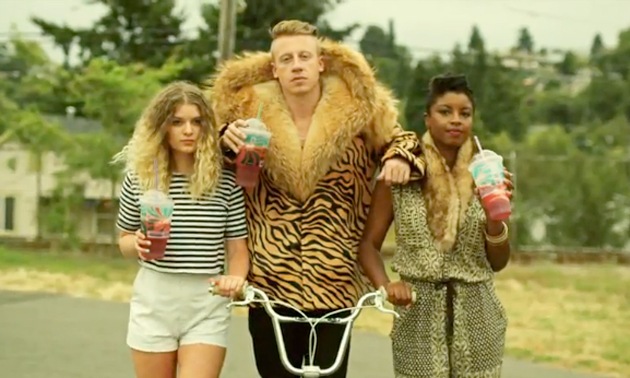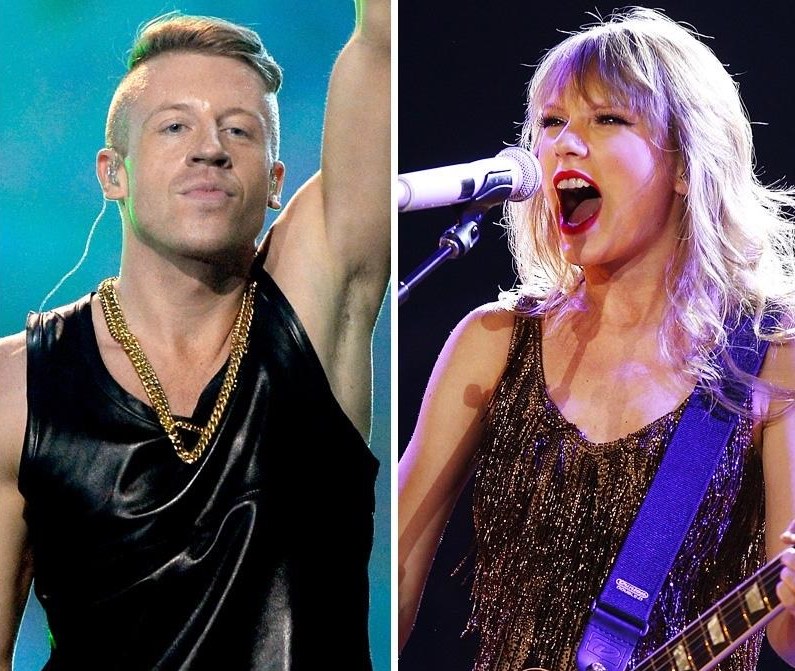- Scooter Braun acquired Big Machine Records and with it all of Swift’s previously released music a few of weeks ago — after Swift said she was “sad and grossed out” by the deal.
- Courtney Love also had a historic showdown with record labels
- Macklemore sidesteps record labels and runs indie music like a boss
July was rough for Taylor Swift. Celebrities took sides in a heated online exchange that started with Taylor posting that someone she considers a bully now owns her entire music catalog, with Justin Bieber jumping in to defend the buyer (his own manager, Scooter Braun).
Taylor ended the post with a strong sentiment for artists to be able to own their own music, which, unfortunately is not the nature of the industry they’re in. Often an artist is “discovered,” the label makes financial investments in creating an album (and the artist as a marketable brand), then the music is shared with the world via albums, digital downloads, and touring shows. The artist receives a percentage of the money, after first paying the label, their agent, business manager, lawyers and others.
Taylor’s not the first artist to publicly have a problem with the way music does business. In a Salon article in 2000, Courtney Love outlined how bands and their labels make money, which was not at all flattering for the industry. She likened the labels to committing piracy and called the investors backing them “VC suckas.” The VC sucka in Taylor Swift’s story would be the aforementioned Scooter Braun.

Another Seattle artist, the wildly successful Macklemore, was also not impressed with the offerings of music labels. In the song Jimmy Iovine, the rapper tells a story (maybe true, maybe based on the idea) of being offered a record deal from one of the industry’s greats that boiled down to “7 percent to split” with collaborator Ryan Lewis. The song ends with the line, “I’m sorry, I thought this was what I wanted. I’d rather be a starving artist than succeed at getting f*****d.”
So, what’s the deal with record labels and artists?
Courtney Love’s Math Letter
In the June 2000 open letter Courtney Love wrote on the industry, she outlined the deals offered by record labels to rock bands. As the lead of band Hole and having been married to Nirvana’s Kurt Cobain, it could be assumed she had experience with those sort of details. The deal she described involved a $1 million advance and a 20% revenue share (which Love clearly stated was purely hypothetical because no band she knew of had ever gotten 20%).
So, what happens to that million dollar advance paid to the band? They pay $100,000 right off the top to their manager. It costs $500,000 to record and produce the album. Their manager gets a 20% commission, which on this deal is $100,000. The lawyer and business manager each get $25,000. The four band members are left with $350,000 to split. After paying $170,000 in taxes, the band is left with $180,000, which comes out to $45,000 per person.
Shockingly, the arrangement doesn’t improve as a band grows in popularity and puts out more albums. Love outlined that scenario in her letter, as well, and it’s hardly any better. (Read her full letter here). Also? The record label owns the music. They can sit on it and never release it. They can sell it a laundry detergent company to use in television commercials. Or they can sell it all together as a catalog to investors, which is what happened to Taylor Swift this week. To put it in perspective, Taylor was 11 years old when Courtney Love wrote this scathing letter, which was only four years before Taylor signed her own record deal. One would have thought that Courtney Love speaking out would change some things, but it didn’t seem to.
The Rise of Macklemore
Macklemore’s albums are self produced, self recorded, and self released by his entity Macklemore LLC, which was named one of Fast Company’s Most Innovative Company in 2014. His debut EP dropped in 2000, ironically, the same year Courtney Love’s scathing industry letter was published. Macklemore released his first full length album in 2005, then in 2012 collaborated with Ryan Lewis for the breakout album, The Heist, which featured the record smashing song Thrift Shop.

Thrift Shop was the first indie hit to top the charts in nearly two decades. The song debuted on the Billboard Hot 100 in September of 2012, steadily climbing the chart until it reached the top ten in January, then took the number one spot in February. Thrift Shop was the second best-selling single of 2013, with 6,148,000 copies sold during the year. The self-directed video for the track was shared on YouTube on August 29th and within a few months racked up almost 42 million views. Now that number (as of July 2019) sits at 1.3 billion views.
As of a few years later, by the end of 2015 Thrift Shop had sold 7,740,000 downloads in the U.S., making it the fifth all-time best-selling digital single in the country. If each of those sold for $1.29 each, that song alone grossed Macklemore $9,984,600. Even if they spent $4 million recording the song, producing the music video, and paying other artists for their involvement, Macklemore and Ryan Lewis splitting nearly $6 million for one song is a heck of a lot better than Courtney Love’s music label scenario. It’s also significantly better than the “7 percent to split” scenario in Jimmy Iovine.
Macklemore’s success didn’t end with Thrift Shop. The album that featured the single, The Heist was released a few weeks after the YouTube debut by Macklemore LLC and topped the charts, too, as did their 2016 collaboration,This Unruly Mess I’ve Made.
Macklemore’s solo album, Gemini, also did very well when released in 2017. Since the release of The Heist, nearly every Macklemore show has sold out- nationally and internationally. This summer, Macklemore is headlining music festivals in Germany, Norway, and France.
How Macklemore LLC Schooled the Music Industry
So, how has Macklemore done what every other artist has only ever dreamed of?
In part, because of the online landscape. Macklemore and his crew could perform at small venues, sell their albums directly to consumers at their shows as well as in digital format on iTunes. They ran the social media game hard, gathering followers as they went, who then purchased the digital albums, and told their friends.
Macklemore grew his online audience first by sharing music on MySpace, uploading singles, EPs, and full albums on iTunes, then created music videos for songs. The music videos were uploaded to YouTube and Facebook, reaching their following plus picking up more fans (and therefore more sales) as followers shared videos on their social platforms. They hired Alternative Distribution Alliance to distribute the music and Warner Bros. for radio promotion.
If you haven’t heard of Alternative Distribution Alliance, you’ve heard of the music they distribute: The Rolling Stones, Jason Aldean, Lenny Kravitz, and many more. The record labels and the companies that own them hire Alternative Distribution Alliance to distribute their music. In Macklemore’s case, he hired them himself.
Macklemore employs this same DIY approach to their tours, merchandise, and website. Years ago, Macklemore LLC hired The Agency Group as a booking agent to line up shows in the Seattle region, then branching out as the venues started selling out. Macklemore owns all his own merchandise, selling at shows and online. The Gemini vinyl and certain merchandise was exclusively sold on his website for a period.

Macklemore has schooled the music industry on how to create and own his art in an industry that seeks to own artists’ music. The environment online plus easily accessible technology will only improve with time. It’s up to the record labels and publishers to re-evaluate their standing in the music process and make the necessary changes if they don’t want artists going the way of Macklemore.
Maybe it’s time for Taylor Swift and Macklemore to have lunch?


